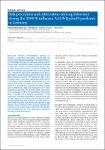Risk perception and information-seeking behaviour during the 2009/10 influenza A(H1N1)pdm09 pandemic in Germany
Walter, Dietmar
Böhmer, Merle
Reiter, Sabine
Krause, Gérard
Wichmann, Ole
During the influenza A(H1N1)pdm09 pandemic in 2009/10, a total of 13 consecutive surveys were carried out of the general population in Germany to monitor knowledge, attitude and behaviour concerning the disease and vaccination against pandemic influenza in real time. In total, 13,010 persons aged 14 years or older were interviewed by computer-assisted telephone techniques between November 2009 and April 2010. During the peak of the pandemic, only 18% of participants stated that they perceived the risk of pandemic influenza as high; this proportion fell to 10% in January 2010. There was a significant difference in information-seeking behaviour among population subgroups concerning the disease and vaccine uptake. However, in all subgroups, conventional media sources such as television, radio and newspapers were more frequently used than the Internet. While the majority of participants (78%) felt sufficiently informed to make a decision for or against vaccination, overall vaccination coverage remained low. Among those who decided against vaccination, fear of adverse events and perception that the available vaccines were not sufficiently evaluated were the most frequently stated reasons. Such mistrust in the vaccines and the perceived low risk of the disease were the main barriers that contributed to the low vaccination coverage in Germany during the pandemic.
No license information
Related Items
Show related Items with similar Title, Author, Creator or Subject.
-
2016-02-18ZeitschriftenartikelVaccine effectiveness in preventing laboratory-confirmed influenza in primary care patients in a season of co-circulation of influenza A(H1N1)pdm09, B and drifted A(H3N2), I-MOVE Multicentre Case–Control Study, Europe 2014/15 Valenciano, Marta; Kissling, Esther; Reuss, Annicka; Rizzo, C.; Gherasim, A.; Horváth, Judit K.; Domegan, L.; Pitigoi, Daniela; Machado, Ausenda; Bella, A.; Paradowska-Stankiewicz, I.; Larrauri, A.; Ferenczi, A.; O´Donell, Joan; Lazar, M.; Pechirra, P.; Korczyńska, M. R.; Pozo, Francisco; Moren, A.Influenza A(H3N2), A(H1N1)pdm09 and B viruses co-circulated in Europe in 2014/15. We undertook a multicentre case–control study in eight European countries to measure 2014/15 influenza vaccine effectiveness (VE) against ...
-
2016-10-13ZeitschriftenartikelImproving influenza virological surveillance in Europe: strain-based reporting of antigenic and genetic characterisation data, 11 European countries, influenza season 2013/14 Broberg, E.; Hungnes, Olav; Schweiger, Brunhilde; Prosenc, Katarina; Daniels, R.; Guiomar, R.; Ikonen, N.; Kossyvakis, A.; Pozo, Francisco; Puzelli, S.; Thomas, I.; Waters, A.; Wiman, Å.; Meijer, AdamInfluenza antigenic and genetic characterisation data are crucial for influenza vaccine composition decision making. Previously, aggregate data were reported to the European Centre for Disease Prevention and Control by ...
-
2013-02-14ZeitschriftenartikelEarly estimates of seasonal influenza vaccine effectiveness in Europe: results from the i-move multicentre case–control study, 2012/13 Valenciano, M.; Kissling, E.We conducted a test-negative case–control study based in five European sentinel surveillance networks. The early 2012/13 adjusted influenza vaccine effectiveness was 78.2% (95% CI: 18.0 to 94.2) against influenza B, 62.1% ...

